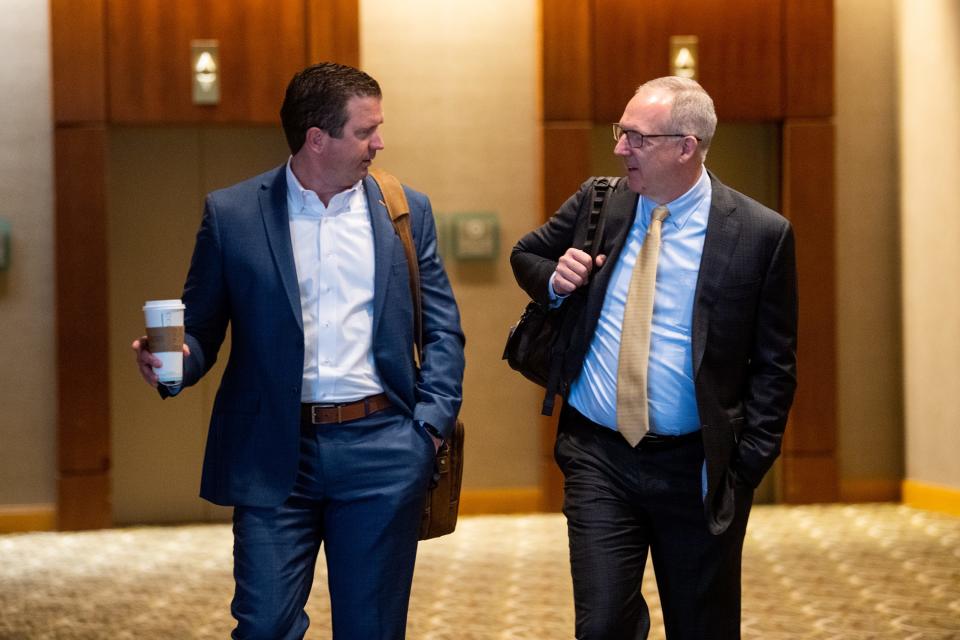Why NCAA investigation of Tennessee football won't damage recruiting | Adams

The mere possibility of an NCAA investigation once terrified school administrators, coaches, and fans.
The outcome often wasn’t as dire as the prolonged uncertainty. It was the college sports equivalent of water torture.
Drip, drip, drip. The wait would go on for months and years. By the time the black cloud lifted – and the NCAA penalty was announced − you easily might have forgotten why a program was investigated in the first place.
Negative recruiting was a concern, too. In a conference as competitive as the SEC, one program’s troubles could become a staple in every other conference school’s recruiting pitch. The pitch might be subtle, but it still could raise a doubt in the minds of a recruit and his family.
But in our current version of college football does an NCAA investigation really matter?
Tennessee’s football program is again in the NCAA cross hairs due to alleged violations of the NCAA's shaky rule on a student-athlete’s right to capitalize monetarily on his name, image, and likeness.
Let’s back up to the NCAA’s last investigation of the UT football program. The investigation lasted for years, not months. And, thanks to Tennessee going the extra mile in cooperating and imposing its own penalties, ended with relatively mild punishment.
And how did the drawn-out process affect Tennessee football?
New coach Josh Heupel won seven games in his first season, improving drastically on the 3-7 record in 2020, the last year of UT’s most infamous recruiter, Jeremy Pruitt. A year later, Heupel led the Vols to 11 wins and a top-10 finish. They were even ranked No. 1 in the first College Football Playoff poll that season.
Some details of that season were downright glorious. The Vols beat two of their biggest rivals, Alabama, and Florida. They also led the nation in scoring and proved to be one of the most watchable teams in college football.
Given that recent history, another NCAA investigation shouldn’t evoke tremors throughout Big Orange Country.
Negative issues usually raise the same question in a college football program: “How will that impact recruiting?”
But times have changed when it comes to recruiting.
Imagine a prospective recruit hearing that the Vols are in trouble because they made another student-athlete more prosperous. I doubt he would say: “Oh no. What if they get a bowl ban one season?” More than likely, he would think, “Wow. They really know how to treat their athletes.”
The biggest question schools must address with recruits isn’t their status with the NCAA. Instead, the recruit – and his parents – want to know how bountiful of an NIL package the school can offer through its sports collective.
Moreover, Tennessee administrators have capitalized on the obstacles presented by the NCAA. Not only did chancellor Donde Plowman and athletic director Danny White rebuke the NCAA’s charges, they stood up for their student-athletes in a big way. Think that won’t play well with recruits?
ADAMS: Imagine the joy of having Tennessee chancellor Donde Plowman write your emails
As for the possibility of negative recruiting, it won’t come from the sport’s elite programs, who – like Tennessee – are competing for the nation’s top players. They’re on Tennessee’s side, because they have the resources to gain an advantage via NIL.
Forget the old black cloud that once accompanied an investigation. Tennessee might find a rainbow at the end of this skirmish with the NCAA.
John Adams is a senior columnist. He may be reached at 865-342-6284 or john.adams@knoxnews.com. Follow him at: twitter.com/johnadamskns.
This article originally appeared on Knoxville News Sentinel: Why NCAA investigation of Tennessee football won't damage recruiting
